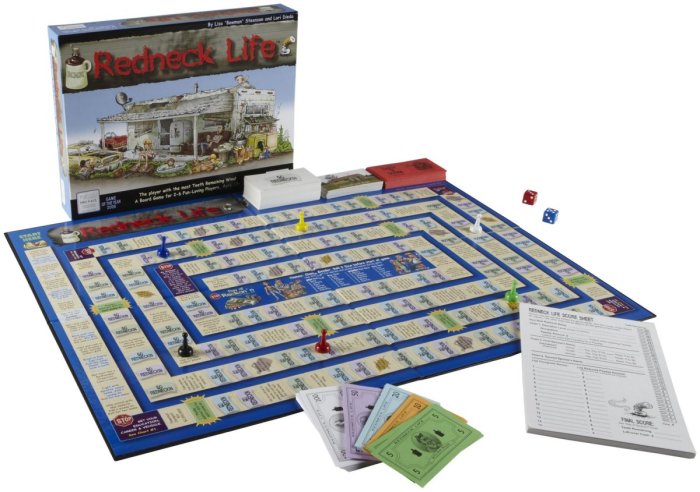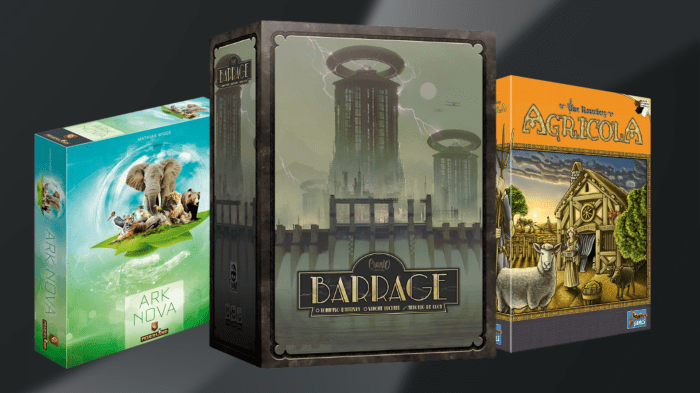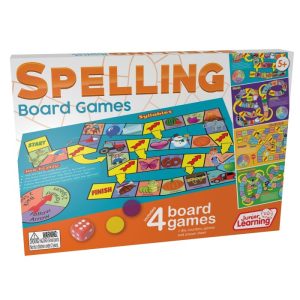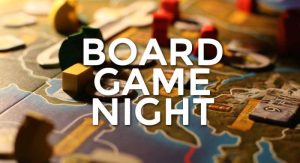
Immerse yourself in the world of Strategy Board Games where every move counts and victory awaits. From classic favorites to modern gems, discover the thrill of tactical gameplay and strategic thinking.
Explore the different types of strategy board games and how they have evolved over time to captivate players of all ages.
Overview of Strategy Board Games

Strategy board games are tabletop games that require players to make decisions and use tactics to achieve victory. These games often involve long-term planning, resource management, and outsmarting opponents.
What makes strategy board games engaging is the mental challenge they provide. Players must think critically, adapt to changing circumstances, and anticipate their opponents’ moves to succeed. The element of uncertainty adds excitement and replay value to these games.
Types of Strategy Board Games
There are several types of strategy board games available in the market, each offering a unique gameplay experience:
- War Games: These games simulate military conflicts and strategic battles, requiring players to command troops and make tactical decisions.
- Eurogames: Also known as German-style board games, these emphasize strategy, resource management, and minimal luck elements.
- Abstract Strategy Games: These games focus on pure strategy and often feature simple rules but complex gameplay, such as chess or Go.
- Deck-Building Games: Players construct their decks of cards throughout the game, strategically choosing cards to optimize their gameplay.
History of Board Games
From ancient civilizations to modern times, board games have been a popular form of entertainment and strategic challenge for people of all ages. These games have evolved over centuries, adapting to different cultures and technological advancements.
Traditional Board Games
Traditional board games date back thousands of years, with early examples found in ancient Egypt, Mesopotamia, and China. These games were often played on boards made of stone, wood, or clay, with pieces crafted from various materials.
- Ancient Egyptian board games like Senet and Mehen were played as early as 3100 BC, featuring symbolic gameplay and religious significance.
- In China, the game of Go originated over 2,500 years ago, known for its simple rules yet complex strategies that have captivated players for generations.
- Ancient Romans enjoyed games like Ludus Latrunculorum (the Game of Mercenaries) and Tabula (similar to modern-day Backgammon), showcasing a mix of luck and skill in gameplay.
Evolution of Strategy Board Games
As societies developed and interactions between cultures increased, board games evolved into more complex and strategic forms. Medieval Europe saw the rise of Chess, a game of tactics and foresight that remains a classic favorite among players worldwide.
Chess is often referred to as the “game of kings,” symbolizing power, strategy, and intellectual prowess.
- In the 19th century, the popularity of games like Checkers and Stratego grew, introducing new challenges and opportunities for players to outwit their opponents.
- The 20th century brought classics like Risk and Settlers of Catan, emphasizing diplomacy, resource management, and long-term planning in gameplay.
Transition to the Digital Age
With the advent of computers and the internet, board games have made a seamless transition into the digital age. Online platforms and mobile apps now offer players the chance to enjoy their favorite games remotely, connecting with friends and competitors from around the world.
- Digital versions of classic board games like Scrabble, Monopoly, and Ticket to Ride have gained popularity, providing convenient ways to play anytime, anywhere.
- New strategy board games designed specifically for digital platforms have emerged, incorporating interactive elements, multiplayer options, and customizable features for a modern gaming experience.
Popular Strategy Board Games
Strategy board games have captured the hearts and minds of players worldwide, offering a perfect blend of challenge, skill, and fun. Let’s explore some of the most popular strategy board games that have stood the test of time.
Settlers of Catan
Settlers of Catan, also known as Catan or Settlers, is a classic strategy board game where players collect resources and build settlements to earn victory points. The game involves negotiation, resource management, and strategic placement of settlements and cities.
Chess
Chess is one of the oldest and most iconic strategy board games, dating back to the 6th century. Players compete on an 8×8 grid, moving pieces strategically to capture the opponent’s king. Chess requires foresight, planning, and tactical thinking.
Ticket to Ride
Ticket to Ride is a popular railway-themed board game where players collect train cards and build railway routes across North America or other regions. The game combines strategy, risk-taking, and route optimization to complete destination tickets and earn points.
Pandemic
Pandemic is a cooperative strategy board game where players work together as a team of disease-fighting specialists to stop global outbreaks and find cures. The game requires collaboration, decision-making, and resource management to save humanity from deadly viruses.
Risk
Risk is a classic world domination strategy board game where players engage in battles, conquer territories, and eliminate opponents to achieve global supremacy. Risk involves strategic planning, diplomacy, and calculated risk-taking to control continents and win the game.
Strategy Development

Developing effective strategies in board games is crucial for achieving success and outsmarting your opponents. It requires a combination of critical thinking, adaptability, and foresight to anticipate your opponent’s moves and plan accordingly.
Common Strategies in Strategy Board Games
- Control the Center: One common strategy is to control the center of the board, as it allows for greater mobility and flexibility in your movements.
- Build Strong Defenses: Creating a solid defense to protect your pieces and territory is essential to prevent your opponent from taking advantage of weaknesses.
- Attack and Retreat: Knowing when to attack and when to retreat is key in strategy board games, as it allows you to strike at the right moment and avoid unnecessary losses.
- Bluffing: Sometimes, bluffing can be an effective strategy to mislead your opponents and make them second-guess their own moves.
Tips for Developing Effective Strategies
- Study the Game: Understanding the rules, mechanics, and objectives of the game is crucial for developing winning strategies.
- Anticipate Opponent’s Moves: Try to predict your opponent’s next moves based on their previous actions and plan your strategy accordingly.
- Be Flexible: Adaptability is key in strategy development, as you may need to adjust your plans based on changing circumstances during the game.
- Practice Makes Perfect: The more you play and practice, the better you will become at developing effective strategies and improving your gameplay.
“In strategy board games, success is not just about making the right moves, but also about thinking several steps ahead and outwitting your opponents.”
Social Aspects of Strategy Board Games
Playing strategy board games goes beyond just the thrill of competition; it also fosters social interaction among players. The collaborative and competitive nature of these games encourages communication, teamwork, and bonding among participants. Let’s delve into how strategy board games promote social engagement and the benefits of playing in a group setting.
Promotion of Social Interaction
Strategy board games provide a platform for players to engage in face-to-face interactions, promoting social connection and communication. Whether players are strategizing together to achieve a common goal or competing against each other, these games facilitate dialogue, negotiation, and the building of relationships. Through gameplay, individuals have the opportunity to interact, share experiences, and create lasting memories.
- Board games encourage players to communicate effectively to devise strategies and make decisions collaboratively.
- Players learn to engage with one another, express their thoughts, and listen to different perspectives.
- Through friendly competition, players develop sportsmanship, respect for others, and the ability to handle victory and defeat gracefully.
Benefits of Playing in a Group Setting
Playing strategy board games in a group setting offers a range of advantages beyond mere entertainment. The social dynamics that emerge during gameplay contribute to personal growth, skill development, and overall well-being.
- Enhanced communication skills: Players learn to articulate their thoughts clearly, negotiate with others, and convey their strategies effectively.
- Teamwork and collaboration: Board games encourage teamwork, cooperation, and the sharing of ideas to achieve common objectives.
- Building relationships: Regular gameplay sessions create opportunities for players to bond, strengthen friendships, and develop a sense of camaraderie.
Concluding Remarks
In conclusion, Strategy Board Games offer a unique blend of entertainment and intellectual challenge, bringing friends and family together in a battle of wits and skill. Dive into the world of strategy gaming and unleash your tactical prowess today!
FAQ Explained
How important are strategy board games for cognitive development?
Strategy board games are excellent for enhancing critical thinking, problem-solving skills, and decision-making abilities, making them beneficial for cognitive development.
Are strategy board games suitable for players of all ages?
Yes, strategy board games come in varying levels of complexity, making them suitable for both children and adults to enjoy.
What makes strategy board games different from other types of board games?
Strategy board games focus on planning, decision-making, and outwitting opponents through strategic gameplay, setting them apart from luck-based or purely thematic board games.






